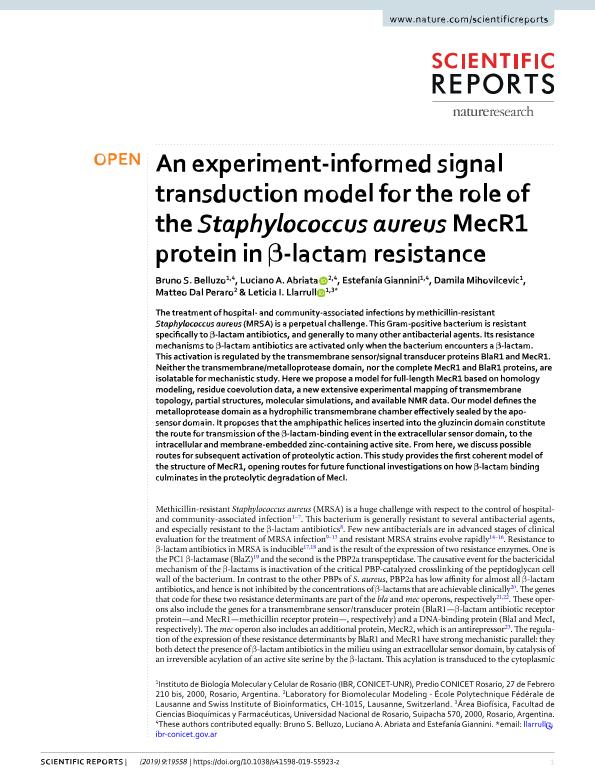Artículo
An experiment-informed signal transduction model for the role of the Staphylococcus aureus MecR1 protein in β-lactam resistance
Belluzo, Bruno Salvador ; Abriata, Luciano Andres
; Abriata, Luciano Andres ; Giannini, Estefanía
; Giannini, Estefanía ; Mihovilcevic, Damila
; Mihovilcevic, Damila ; Dal Peraro, Matteo; Llarrull, Leticia Irene
; Dal Peraro, Matteo; Llarrull, Leticia Irene
 ; Abriata, Luciano Andres
; Abriata, Luciano Andres ; Giannini, Estefanía
; Giannini, Estefanía ; Mihovilcevic, Damila
; Mihovilcevic, Damila ; Dal Peraro, Matteo; Llarrull, Leticia Irene
; Dal Peraro, Matteo; Llarrull, Leticia Irene
Fecha de publicación:
12/2019
Editorial:
Nature Research
Revista:
Scientific Reports
ISSN:
2045-2322
Idioma:
Inglés
Tipo de recurso:
Artículo publicado
Clasificación temática:
Resumen
The treatment of hospital- and community-associated infections by methicillin-resistant Staphylococcus aureus (MRSA) is a perpetual challenge. This Gram-positive bacterium is resistant specifically to β-lactam antibiotics, and generally to many other antibacterial agents. Its resistance mechanisms to β-lactam antibiotics are activated only when the bacterium encounters a β-lactam. This activation is regulated by the transmembrane sensor/signal transducer proteins BlaR1 and MecR1. Neither the transmembrane/metalloprotease domain, nor the complete MecR1 and BlaR1 proteins, are isolatable for mechanistic study. Here we propose a model for full-length MecR1 based on homology modeling, residue coevolution data, a new extensive experimental mapping of transmembrane topology, partial structures, molecular simulations, and available NMR data. Our model defines the metalloprotease domain as a hydrophilic transmembrane chamber effectively sealed by the apo-sensor domain. It proposes that the amphipathic helices inserted into the gluzincin domain constitute the route for transmission of the β-lactam-binding event in the extracellular sensor domain, to the intracellular and membrane-embedded zinc-containing active site. From here, we discuss possible routes for subsequent activation of proteolytic action. This study provides the first coherent model of the structure of MecR1, opening routes for future functional investigations on how β-lactam binding culminates in the proteolytic degradation of MecI.
Palabras clave:
Staphylococcus aureus
,
MecR1
,
beta-lactam antibiotics
Archivos asociados
Licencia
Identificadores
Colecciones
Articulos(IBR)
Articulos de INST.DE BIOLOGIA MOLECULAR Y CELULAR DE ROSARIO
Articulos de INST.DE BIOLOGIA MOLECULAR Y CELULAR DE ROSARIO
Citación
Belluzo, Bruno Salvador; Abriata, Luciano Andres; Giannini, Estefanía; Mihovilcevic, Damila; Dal Peraro, Matteo; et al.; An experiment-informed signal transduction model for the role of the Staphylococcus aureus MecR1 protein in β-lactam resistance; Nature Research; Scientific Reports; 9; 1; 12-2019; 19558-19572
Compartir
Altmétricas



